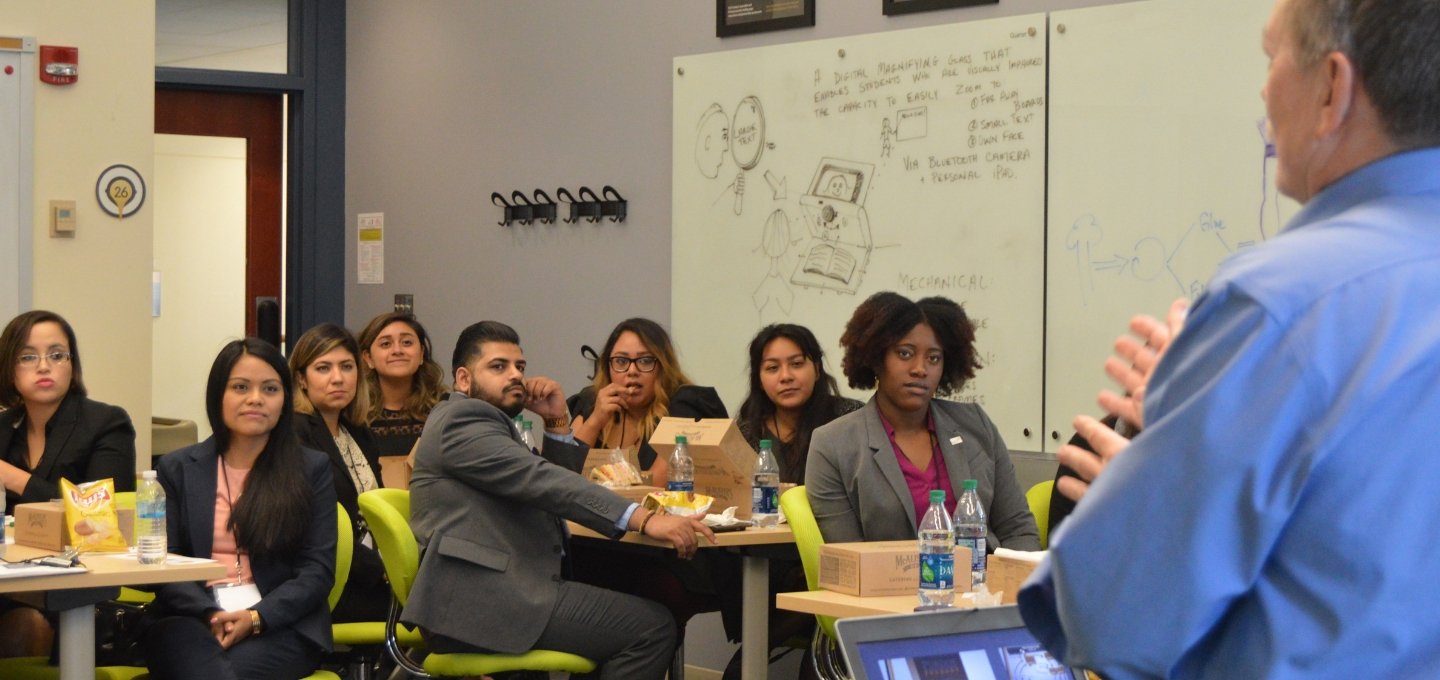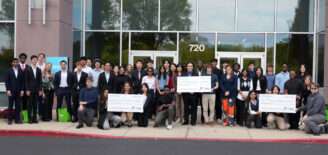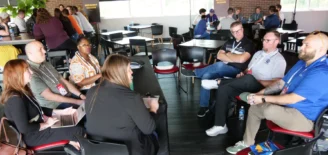Purdue Foundry guides hundreds of ideas into brand-new businesses
When Purdue University president Mitch Daniels arrived on campus in 2013, he quickly unearthed a rare and valuable resource with great potential. The vast intellectual property developed by Purdue’s students, faculty and staff was already impressive, but the university was failing to capture the highest commercialization potential. President Daniels tasked the Purdue Research Foundation to solve this issue.
Born from this challenge to more quickly develop the university’s IP, the Purdue Foundry was formed the same year as Daniels’ arrival with a goal to move Purdue IP to its greatest impact in the market. To date, the Foundry has guided 203 new ideas into launchable business ventures and secured nearly $350 million in venture funding. While their physical space may be just a few workrooms and whiteboards, the Foundry’s presence extends far beyond the borders of their building, the Burton D. Morgan Center for Entrepreneurship, in West Lafayette, Ind.
Foundry graduates have included a police officer who, while working the beat on Purdue’s campus, created a special outer covering for bulletproof vests so that officers can carry the tools of their trade on their chests to reduce back injuries. As expected from the esteemed university, about 50 percent of new Foundry ventures focus on engineering, and another 20 percent on agriculture; however, new ideas spread across many industries. From devices helping Parkinson’s patients regain their voice to medicine treating a rare but devastating disease that afflicts children, Foundry companies have brought about some truly life-changing innovations discovered by the university’s world-class researchers.
From idea to venture
No matter what industry it’s in, a new venture begins in the Foundry’s Firestarter program, a six-week intensive program to develop an idea’s business feasibility. Between their full-time day jobs, intrepid entrepreneurs hammer through 18 credit hours’ worth of classroom material to get them started on their businesses.
Many of these new ideas originate from Purdue IP. Thanks to a strong working relationship between the Foundry and Purdue’s Office of Technology Commercialization, founders typically find it easy to get licenses to develop inventions based on that IP. Other ideas come directly from the founders–think Purdue students who shape an idea between classes–and Purdue’s system lets them retain their IP rights and build their creations.
Founders are situated in their cohort by this point, with six or seven founders working together through the second phase: market validation. Companies go out into the community and interview potential customers to discover if their idea has market merit. They usually interview about 30 people, though some reach upwards of 100. “We walk them through a process of validating that business model and have them go out and talk to the marketplace. We’ll talk to customers and validate that your model actually works,” said Dr. Tim Peoples, the Foundry’s managing director.
The third phase involves creating a business plan, which is where the Foundry spins up its student and alumni support. “During the comprehensive planning stage, we bring in a lot of resources from the community, whether it’s MBA graduate assistants that will assist clients with market analysis or competitive analysis, students that want to practice building websites, or folks who know how to do prototyping or 3D printing,” said Tim. “We really reach out to the broader community to find people to assist.”
By the time these companies reach the fourth phase, they’re ready to try their hand at the business in real-world settings. The go-to-market phase can take anywhere from 90 days to a year or more, depending on what the company is creating. The Foundry supports them through entrepreneurs-in-residence, events and connections to funding opportunities. Companies also get access to a wide range of support activities, like accounting, legal services and business management.
When it comes to funding, Purdue Ventures financially supports Foundry companies. The fund, which is supported by the Purdue Research Foundation and managed by the Foundry, manages three major funds, including one operated in tandem with Elevate Ventures. Some of these funds offer up to $100,000 to Foundry startups. Companies are also supported if they qualify to pursue research funding, like the National Science Foundation’s SBIR grants, to supplement their coffers. The Foundry also actively recruits venture capital firms from around the country to visit companies and take part in investment rounds.
West Lafayette and beyond
Continuous learning is essential for the Foundry’s success, and alumni play a crucial role in this endeavor. While the largest networks of alumni mentors reside in West Lafayette, Purdue boasts healthy alumni groups from Silicon Valley to Chicago–East Coast to West Coast and around the world. More than 450,000 Purdue alumni have set up shop just about everywhere. The Foundry tracks these alumni in their databases to find the best pairings for companies, and then they deploy events and build connections to create opportunities for collisions.
Despite the resources available at the Foundry, not all the startups launched are successful: of the 203 startups created with the help of the Foundry, more than 160 are still in operation. Plus, given some companies’ long time horizons, many ventures’ ultimate fates are still unknown. Still, Tim has gleaned some of the traits most important to a business’s chances at winning: humbleness, passion and persistence are all critical for companies that want to succeed.
The Foundry embodies a lot of what Tim’s seen in successful companies. The organization has played a big role in inspiring entrepreneurs around the Purdue community. “I think that the impact that the Foundry has had, has been one in which we’re enriching the entrepreneurial ecosystem,” he said. “Instead of isolated islands of entrepreneurial activity, we now have a place that people can come to get help and find resources to participate.”
With new opportunities like the launch of the Foundry@WestGate in Odon, Ind., Tim sees an even greater impact that the Foundry will create going forward. “The bigger vision is how can we assist the entire state along with other universities, how can we all raise the tide here for the state of Indiana.”
You can find more information on connecting with Purdue Foundry by visiting their website.



